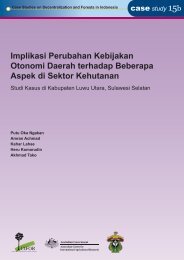Adaptive collaborative management of community forests in Asia ...
Adaptive collaborative management of community forests in Asia ...
Adaptive collaborative management of community forests in Asia ...
You also want an ePaper? Increase the reach of your titles
YUMPU automatically turns print PDFs into web optimized ePapers that Google loves.
Chapter 3: <strong>Adaptive</strong>ness and Collaboration <strong>in</strong> Community Forestry <strong>in</strong> Nepal • 73<br />
<strong>management</strong> approach 17 . For example, the follow<strong>in</strong>g attitudes appeared to<br />
enable ACM approaches to take root and enhance livelihood outcomes:<br />
• a ‘learn<strong>in</strong>g attitude’ to <strong>management</strong>, <strong>in</strong>clud<strong>in</strong>g a will<strong>in</strong>gness to<br />
experiment, and the perception <strong>of</strong> ‘failures’ as opportunities to<br />
learn;<br />
• openness and understand<strong>in</strong>g between gender and caste and wealth<br />
groups, or at least a will<strong>in</strong>gness and ability to question the exist<strong>in</strong>g<br />
hierarchy and forms <strong>of</strong> dom<strong>in</strong>ation (empowered question<strong>in</strong>g);<br />
• confidence to participate and to try new ways <strong>of</strong> operat<strong>in</strong>g;<br />
• openness to participation, cooperation, shar<strong>in</strong>g <strong>of</strong> <strong>in</strong>formation and<br />
communication;<br />
• honesty and transparency <strong>in</strong> leadership and fund <strong>management</strong>;<br />
• a will<strong>in</strong>gness to share power and benefits; and<br />
• a sense <strong>of</strong> ownership <strong>of</strong> the forest.<br />
Note that although such attitudes are important to the successful function<strong>in</strong>g<br />
<strong>of</strong> ACM, they are not a prerequisite to <strong>in</strong>itiat<strong>in</strong>g it. Rather, experiences <strong>in</strong><br />
this project <strong>in</strong>dicate a positive feedback loop between the attitudes and<br />
behaviours and the ACM approach—<strong>in</strong> other words, cogeneration <strong>of</strong> these<br />
<strong>in</strong>tangibles is possible (Box 3-3). We elaborate on this and other causal<br />
forces under ‘Reflections,’ below.<br />
Box 3-3. Chang<strong>in</strong>g attitudes towards participation<br />
Village development committee-level FECOFUN Chairperson Mr Rikhi<br />
Bahadur Rana said, ‘I am retired army staff and I believed only law and order<br />
before and <strong>in</strong>itially I felt some difficulty to come up with the ACM Process for<br />
more democratic decision-mak<strong>in</strong>g and plann<strong>in</strong>g process. Now I am gradually<br />
changed towards the participatory decision-mak<strong>in</strong>g process’. (Kaski ACM<br />
Team 2002: 3-27)<br />
In terms <strong>of</strong> skills, effective facilitation <strong>of</strong> participatory processes and<br />
leadership skills with<strong>in</strong> or accessible to the group (to <strong>in</strong>itiate change,<br />
generate vision and momentum, and support other capacity build<strong>in</strong>g)<br />
can be considered necessary for an ACM approach. As with the attitudes<br />
above, a positive feedback loop is <strong>in</strong>volved here, too: <strong>in</strong> the research sites,<br />
these skills tended to be enhanced and re<strong>in</strong>forced by the application <strong>of</strong><br />
the ACM approaches, <strong>in</strong>clud<strong>in</strong>g the identification <strong>of</strong> capacity-build<strong>in</strong>g<br />
needs and active seek<strong>in</strong>g <strong>of</strong> support from external actors. Other skills and
















